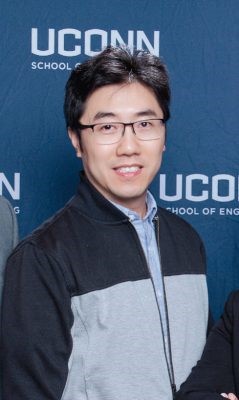Story by Elizabeth Hannabach, Marketing and Social Media Intern, UConn UTC-IASE

While progressing in his academic career at the University of Michigan, he was always drawn to finding ways to improve performance and evaluation of production systems by utilizing systems engineering, mathematics, and programming to generate more effective production lines. During his time in the Midwest, Dr. Zhang was always surrounded by large automotive companies where production lines played a major role in the day-to-day assembly. This garnered his interest, and he began his research in finding ways to improve automotive company manufacturing systems. He was able to identify areas of improvement to allow for U.S.-based manufacturing to become more competitive with other global titans in the automotive industry.
Dr. Zhang continued to work with manufacturing systems, but his focus shifted towards medium and smaller-scale assembly as he moved to Wisconsin. His research began to focus on how to apply new advances in research to these kinds of manufacturing systems so that solutions could be found for these companies when there are not the same large capital budgets available and when there is a more limited, smaller workforce. He strived to find assembly formats that benefited the company in a way that was feasible based on their available budget and resources.
In 2013 Dr. Zhang joined the faculty at UConn. To this day Dr. Zhang continues to work on his research regarding small and medium manufacturers to make a positive difference in the assembly of their products so that they are able to flourish in such a competitive environment. Because of his recognized work in this area, Dr. Zhang and his team were able to obtain grants to further his research as well as collaborate with other departments within the University of Connecticut. They continue to look into utilizing more standardized tools and incorporating them into the manufacturing algorithms they virtually generate so that any small or medium-sized company can implement these methods in their assembly processes.
Something Dr. Zhang strives to do in addition to his research is to bridge the gap between the research studies being conducted and the implementation and application of their findings in the field. As technology advances and software becomes more precise with their measurements, high-quality data that large companies are able to obtain are now accessible for smaller businesses as well. Although it may be easier for large companies to begin the process of utilizing these research findings as they have more in-house support, it does not daunt Dr. Zhang and his work with smaller companies. His passion for his research and the benefit for smaller manufacturers keeps him pushing forward. It takes more persuasion and effective communication between him and his team and the companies they collaborate with, but their strong work ethic helps them surpass these challenges.
As important as his service is to the manufacturing community when it comes to what Dr. Zhang is most proud of, it is his students. Being able to watch them gain confidence in their knowledge while providing them with real-world experience is something he reflects fondly on. As he watches members of his research team become more capable analysts through practical situations, he notes how they are able to find solutions in real-time and implement what they have learned through their time with him.
Dr. Zhang notes, “As an educator, you want your students to succeed. And that’s one of our priorities. I would be more than happy if my students eventually could work at a higher level than me and surpass my own capabilities.” He believes that if he is able to move his students into the workforce, more capable than he is, then that is the most successful thing he can achieve as a teacher at UConn.
Some final lessons Dr. Zhang would want to impart on his students: Firstly, engineers should design innovative things that hold value and strive to benefit the engineering field not just on paper, but also in practical applications, Secondly, ask questions and maintain the attitude to ask questions and think critically. “There are always new things, new challenges, something unexpected… be curious about every single detail you see in the field, and this will all come together and eventually form a final solution you can deliver to your customer.”
Follow us here: https://www.linkedin.com/company/southern-new-england-iac